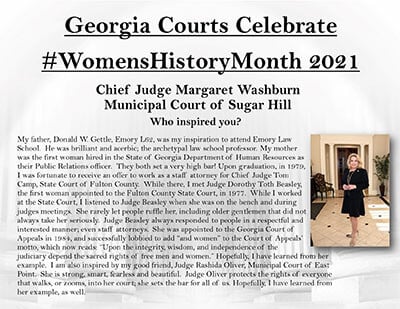HUDSON v. The STATE, A19A2108 2019 WL 600031
By: Margaret Gettle Washburn, Past President/Editor
In the recent opinion of Hudson v. State, the Court of Appeals affirmed the Gwinnett County Superior Court, Judge Melody Conner, where the Defendant was convicted in a bench trial of aggravated sexual battery, statutory rape, and aggravated child molestation. He made a motion for new trial, which was denied, and filed his appeal, arguing that the trial court erred in denying his motion to suppress.
Judge Mercier authored the opinion for the Court of Appeals, holding: (1) the officer’s statements to the Defendant of an admonishing nature did not render Defendant’s confession involuntary, and (2) the officers had probable cause to make a warrantless arrest, and thus, the Defendant’s subsequent incriminating statements were not subject to suppression as fruit of an unlawful arrest.
The evidence showed that in November 2015, the mother of a 13-year-old (D. M.) reported to police that she had discovered sexually explicit social media messages exchanged between D. M. and Hudson, who had met online.
The police interviewed D. M., who made statements as to correspondence and sexual contact. She also identified Hudson’s picture out of a photographic lineup. The officers went to Hudson’s wife’s apartment and spotted him running; apprehended him, arrested him, placed him in a patrol car, and read him his rights pursuant to Miranda v. Arizona.
Thereafter, Hudson made several statements to police; initially denying any inappropriate conduct and asserting that he did not know D. M. This is a portion of the conversation:
“Hudson: Ain’t gonna help me neither sir if I go to jail. If I tell you I messed with her like, I’m admitting the guilt.
Officer: At least then I could tell them you cooperated instead of lying to me. Then denying it and them proving that you denied it and lied. They [will] throw the book at you.”
Hudson then admitted that he and D. M. had engaged in sexual intercourse, among other sexual acts; however, that D. M. had told him she was 20 years old.
Prior to trial, Hudson moved to suppress his statements to police. The trial court granted the motion in part, excluding any custodial statements Hudson made before he was advised of his Miranda rights, but denied the motion as to statements made after he received the Miranda warnings. The case proceeded to a bench trial on stipulated evidence, and the trial court found Hudson guilty of aggravated sexual battery, statutory rape, and aggravated child molestation. Hudson filed a motion for new trial, which the trial court denied, and this appeal followed.
The Defendant argued that his “confession was the product of a threat.” The “trial court must consider the totality of the circumstances and assess whether the defendant made the statement voluntarily.” Blackwell v. State, 337 Ga. App. 173, 174, 786 S.E.2d 552 (2016). See also OCGA § 24-8-824 (“To make a confession admissible, it shall have been made voluntarily, without being induced by another by the slightest hope of benefit or remotest fear of injury.”).”
Further, “[t]here is a material difference between a statement to a [suspect] that it would be better for him to tell the truth, and one wherein he is told that it would be better for him to make a confession.” Rogers v. State, 142 Ga. App. 387, 388 (2), 236 S.E.2d 134 (1977).
The Court found: “Undoubtedly, the officer in this case admonished Hudson not to lie. But the officer did not tell Hudson that he would be better off if he confessed, offer Hudson any benefit in exchange for the confession, or threaten injury if Hudson refused to cooperate with the police.” He was not harmed and the officer “merely warned Hudson of the consequences of lying to the police.”
The totality of these circumstances authorized the trial court to conclude that Hudson confessed voluntarily. See Blackwell, supra at 176 (1), 786 S.E.2d 552 (“[A] statement by police that makes the [D]efendant aware of potential legal consequences is in the nature of a mere truism that does not constitute a threat of injury or promise of benefit[.]”) (Citation and punctuation omitted).
The Defendant also argued that his arrest was illegal because the arresting officers did not have an arrest warrant or probable cause to believe that he had committed a crime. He thus claims that his incriminating statements, which in his view were “discovered as a result of the unlawful arrest,” should have been suppressed. This claim has no merit.
“As an initial matter, he stipulated…to the admissibility of his statements to police, asserting at the beginning of the bench trial that he only wished “to preserve the issue of the confession, the voluntariness,” and otherwise had “no objection” to the evidence. Hudson, therefore, affirmatively waived any argument that the confession was inadmissible as the fruit of an unlawful arrest. See Adams v. State, 306 Ga. 1, 3 (1), 829 S.E.2d 126 (2019) ([D]efendant affirmatively waived alleged error relating to admission of evidence by stating that he did not object to the evidence and that it had been properly admitted).”
The evidence showed that the officers arrested Hudson after 13-year-old D. M. identified him as the man who engaged in sexual intercourse and oral sex with her. “A warrantless arrest is constitutionally valid if at the time of the arrest the arresting officer has probable cause to believe the accused has committed or is committing an offense. Probable cause exists if the arresting officer has knowledge and reasonably trustworthy information about facts and circumstances sufficient for a prudent person to believe the accused has committed an offense.” Devega v. State, 286 Ga. 448, 451 (4) (b), 689 S.E.2d 293 (2010). (Citation and punctuation omitted).
The Defendant then argued that the officers did not know who he was when they arrested him; however, the evidence showed that before the police knocked on the door to the apartment, they saw him walking toward the apartment and one officer recognized him. Audio showed that when the Defendant asked them who they wanted, an officer responded, “Robert Lee Hudson, you.” Therefore, his incriminating statements were not subject to suppression as the fruit of an unlawful arrest. See Devega, supra (“[E]ven if we assume that the warrantless arrest in this case was illegal…, suppression of the fruits of that arrest is not required because the arrest was made with sufficient probable cause and in an office, rather than in the sanctity of the home.”); (“[T]he standard of probable cause is an objective one[.]”) (Punctuation omitted).
Judgment affirmed.


